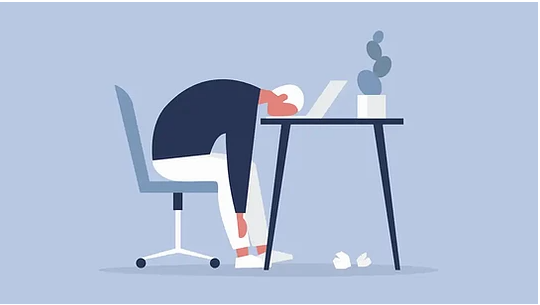Burnout: Understanding it and Bouncing Back
Why Do We Feel Burned Out?
Feeling burned out is a natural human experience that almost everyone goes through at some point. Our modern, fast-paced lifestyle filled with constant connectivity and an overbooked calendar can easily lead us to this state of mental, physical and emotional exhaustion. There are a few key factors that typically contribute to the experience of burnout:
Work Overload and Lack of Balance
Constantly taking on more tasks and responsibilities without limiting our workload or setting clear boundaries often results in burnout due to workload. Piling task after task onto our already full plates leaves little room for rest, self-care, relationships and hobbies - all of which are essential for recharging our mental batteries.

Unrealistic Expectations
Holding ourselves to extremely high perfectionist standards or believing we must be superheroes who can skillfully “do it all” also fuels burnout. When we’re constantly striving to meet unrealistic expectations without allowing for human error or limitations, it’s easy to feel like a failure — which damages our self-esteem and clouds our perspective.
Understanding the Burnout Experience
While the causes of burnout vary, there are some common signs and symptoms experienced by those in this state of mental and physical exhaustion. Key indicators that one may be experiencing burnout include:
Emotional, Mental and Physical Fatigue
Feeling drained of energy, both physically and mentally, is a tell-tale sign of burnout. Simple tasks may seem daunting, and it becomes increasingly difficult to muster the motivation to engage in activities you typically enjoy.
Increased Negativity and Cynicism
When burned out, it’s common to view the world through a negative lens and criticize others more readily. Our default mindset shifts from optimism to pessimism.
Coping with Burnout in the Short-Term
If you recognize the signs of burnout taking hold, it’s important to take immediate steps to better cope in the short-term as you work on implementing long-term lifestyle changes. Some strategies include:
Taking Time Off
When possible, take paid time off from work to completely detach and avoid burnout-triggering stresses. Even just a long weekend can help reset your perspective.
Practicing Self-Care
Focus on nourishing your mind, body and soul through adequate sleep, healthy eating, soothing activities and social support. Make self-care non-negotiable.
Bouncing Back from Burnout through Long-Term Solutions
While taking a break can provide temporary burnout relief, long-lasting recovery requires identifying and addressing the core causes of imbalance through sustainable lifestyle tweaks. Implementing the following strategies can help you bounce back stronger:
Establishing Boundaries and Prioritizing Rest
Learning to say “no” and limit your workload are essential to prevent burnout from resurfacing. Schedule rest into your calendar just as you would appointments.
Challenging Unrealistic Expectations
Reframe your perception of success to be based on efforts, not results alone. Accept that mistakes and limitations are human. Pressure lifts when you give yourself permission to be imperfect.
Renewing Your Perspective and Finding Fulfillment
To fully overcome burnout, it’s critical to cultivate passion and purpose beyond just your career. Nourishing your soul outside of work through meaningful hobbies and relationships can restore zest for life.
Practicing Gratitude and Self-Compassion
Shifting your focus to appreciating life’s small blessings, rather than dwelling on stresses, uplifts your mindset. Be gentle with yourself through struggles - you deserve love and understanding, too.
Thriving Beyond Burnout
With effort, adopting a more balanced lifestyle and mindset can help you not just bounce back from burnout, but transcend it entirely to a place of enhanced well-being, productivity and joy. Continuing to refine your approach through experience keeps burnout securely in the past.
Living With Greater Intentionality
Constantly reflect on determining your core values and priorities to guide decision making. Less time is wasted on trivialities, leaving more for meaningful pursuits aligned with your true passions.
By understanding the root causes of burnout and implementing sustainable self-care strategies, you have the power to not only recover but to thrive long-term in both your career and overall well-being. With care, recovery from burnout is absolutely possible.
